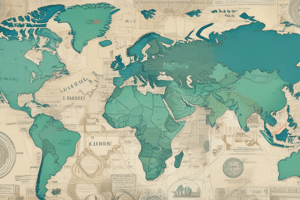Podcast
Questions and Answers
The United Nations has only five main organs.
The United Nations has only five main organs.
False (B)
NATO is an international organization that aims to promote international cooperation on human rights and environmental concerns.
NATO is an international organization that aims to promote international cooperation on human rights and environmental concerns.
False (B)
The European Union has 30 member states.
The European Union has 30 member states.
False (B)
The primary goal of the United Nations is to promote international trade.
The primary goal of the United Nations is to promote international trade.
The North Atlantic Treaty Organization was established in 1950.
The North Atlantic Treaty Organization was established in 1950.
The International Court of Justice is one of the main organs of the United Nations.
The International Court of Justice is one of the main organs of the United Nations.
The European Commission is responsible for negotiating and implementing international trade agreements.
The European Commission is responsible for negotiating and implementing international trade agreements.
The International Criminal Court (ICC) has the mandate to investigate and prosecute countries for international crimes.
The International Criminal Court (ICC) has the mandate to investigate and prosecute countries for international crimes.
The International Monetary Fund (IMF) aims to promote international monetary cooperation and exchange rate instability.
The International Monetary Fund (IMF) aims to promote international monetary cooperation and exchange rate instability.
The World Bank's goal is to promote sustainable economic growth in developed countries.
The World Bank's goal is to promote sustainable economic growth in developed countries.
The Global Challenges Foundation advocates for decreased cooperation and coordination among nations and other actors.
The Global Challenges Foundation advocates for decreased cooperation and coordination among nations and other actors.
International organizations play a vital role in facilitating competition among nations and other actors.
International organizations play a vital role in facilitating competition among nations and other actors.
Flashcards are hidden until you start studying
Study Notes
Global Governance and International Organizations
International organizations play a crucial role in global governance, providing a structure for dialogue, cooperation, and collective action among nations and other actors. These organizations help to manage global issues and promote international cooperation on various fronts, including security, trade, human rights, and environmental concerns.
United Nations (UN)
The UN is the most well-known international organization, with its primary goal to maintain international peace and security, develop friendly relations among nations, promote social progress and development, and uphold human rights. The UN has six main organs: the General Assembly, the Security Council, the Economic and Social Council, the International Court of Justice, the Secretariat, and the Trusteeship Council.
North Atlantic Treaty Organization (NATO)
NATO is an intergovernmental military alliance that aims to provide collective defense and political coordination among its member states. It was established in 1949 and has since grown to include 30 members. NATO's primary responsibility is to safeguard the security of its members through collective defense, which is enshrined in Article 5 of the North Atlantic Treaty.
European Union (EU)
The EU is a political and economic union of 27 European countries. It aims to promote peace, prosperity, and cooperation among its members. The EU has a range of institutions, including the European Commission, the European Council, and the European Parliament, which collectively work to implement EU policies and manage its affairs.
World Trade Organization (WTO)
The WTO is an international organization that deals with the global rules of trade between nations. Its main function is to ensure that trade flows as smoothly, predictably, and freely as possible. The WTO is responsible for negotiating and implementing international trade agreements, as well as providing a platform for member countries to discuss and resolve trade-related issues.
Other Important International Organizations
- International Criminal Court (ICC): The ICC is an independent judicial body with the mandate to investigate and prosecute individuals for international crimes, such as genocide, war crimes, and crimes against humanity.
- World Bank: The World Bank is a global institution that provides financial and technical assistance to developing countries. Its goal is to help reduce poverty and improve living standards by promoting sustainable economic growth.
- International Monetary Fund (IMF): The IMF is an international organization that aims to promote international monetary cooperation, exchange rate stability, and high employment. It provides financial assistance and advice to member countries to help them manage their economies and avoid financial crises.
Challenges and Future of International Organizations
Despite their contributions to global governance, international organizations face several challenges, including limited resources, political disagreements, and the evolving nature of global risks. Addressing these challenges will require innovative solutions and a more effective global governance system.
The Global Challenges Foundation, for example, advocates for increased cooperation and coordination among nations and other actors, as well as for the development of new and improved mechanisms for global decision-making. The Foundation believes that the current global governance system is inadequate to address the scale and complexity of today's challenges and supports research and change leaders to address these issues.
In conclusion, international organizations play a vital role in global governance, facilitating dialogue, cooperation, and collective action among nations and other actors. As the world continues to face complex challenges, the need for effective international organizations and a robust global governance system becomes increasingly important.
Studying That Suits You
Use AI to generate personalized quizzes and flashcards to suit your learning preferences.




